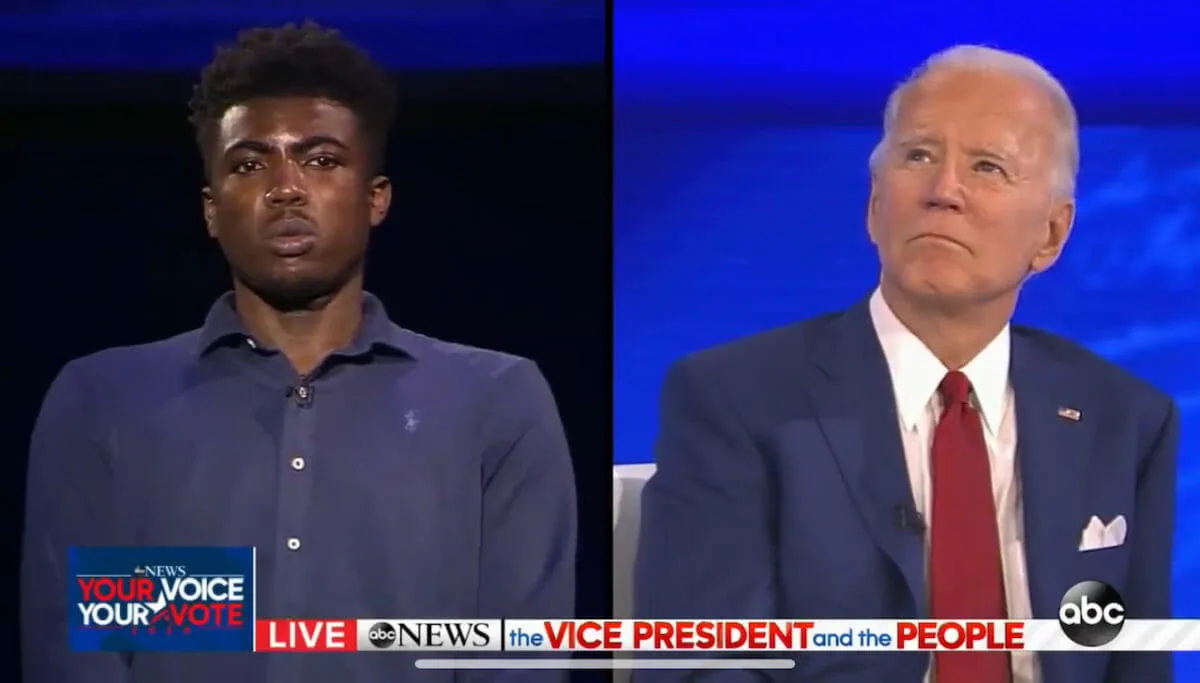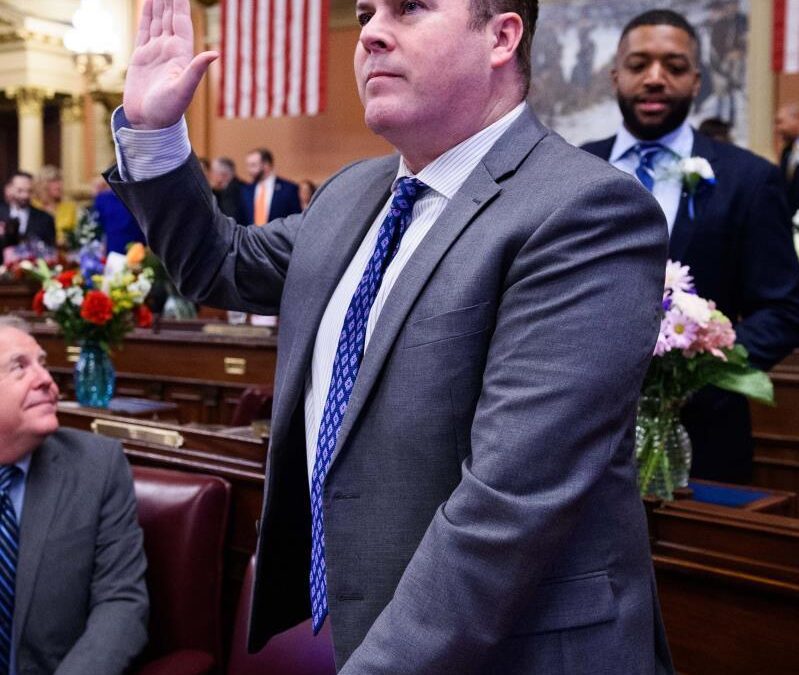
Cedric Humphrey asks Joe Biden a question during a town hall on ABC in early October. (Screenshot)
Biden isn’t guaranteed their vote, even if they don’t vote for Trump. How does he reach them?
Cedric Humphrey stands tall on the top row of the Sidney Kimmel Center at the National Constitution Center looking down at former Vice President Joe Biden. The room normally holds the venue’s “Freedom Rising” theatrical performance and film, a stirring and challenging presentation that surrounds the viewer with a 360-degree portrayal of the nation’s fight for freedom.
The show is filled with the voices and images of American icons including: Thomas Paine, an abolitionist; Thomas Jefferson, a slave holder; Frederick Douglass, a man who escaped slavery; Abraham Lincoln, the emancipator; and the civil rights heroes of the 1960s.
On this night, instead, it is the former vice president who is taking questions as part of a town hall broadcast across the country. Humphrey’s turn has arrived and the Pitt student has a pointed question.
“Many people believe that the true swing demographic in this election will be Black voters under the age of 30,” Humphreys says. “Not because they’ll be voting for Trump, but because they won’t vote at all. I myself have had this exact same conflict. So my question for you is besides, ‘You ain’t Black,’ what do you have to say to young Black voters who see voting for you as further participation in a system that continually fails to protect them.”
A young progressive, Humphrey later told The Keystone that he plans to vote for Biden.
“The main root of my question,” the 21-year-old said, was about people “who rightfully feel that their vote won’t account to any change. … That the system doesn’t react to them or benefit them in any way?”
Humphrey said he has concerns Biden won’t go far enough. “There’s a lot of system-wide change I’d love to see,” he said.
Humphrey’s question is one that elected officials, advocacy groups, and voters have grappled with for quite some time.
RELATED: Obama’s Biden Pitch in Philly Focuses on Strengthening Support Among Black Men
A study by American University this year reinforces Humphrey’s comment about young Black voters. Those who plan to vote overwhelmingly support Biden by an almost 6-1 ratio over President Donald Trump. However, 47% of Black voters age 18 to 29 don’t plan to vote at all, according to the study.
The survey of young Black voters took place from July 1-9 and included 1,215 randomly selected respondents from Florida, Georgia, Michigan, North Carolina, Pennsylvania and Wisconsin. The African American Research Collaborative conducted the survey, which had a margin of error of 3%.
The people courting young Black voters say several things make it difficult to reach them, including false narratives and misinformation.
The Influence of Young Black Voters
Terrell Smith, 27, knows what Humphrey is talking about. As the organizing director for NextGen Pennsylvania, he has a history of reaching out to voters and helping turn them out.
A lot of people feel like Humphrey, he said.
“It’s so important that we pay attention to the sentiments that [Humphrey] raised,” Smith said.
NextGen America is a progressive nonprofit that advocates for young people to vote for policies like climate change, health care, and immigration. Earlier this year, it polled young Black voters on their priorities. When asked to rank their top three issues, those voters chose health care (38%), college debt (35%), climate (35%), and the economy (32%).
He pointed out that the drop in Black turnout between President Barack Obama’s reelection campaign in 2012 and Hillary Clinton’s campaign in 2016 helped turn the election in Trump’s favor.
According to a Pew Research Center study, Black turnout fell from more than 65%, which was above white turnout, in 2012, to 59.6% in 2016.
Smith said Millennials and Gen Z can make up that difference.
“Younger generations are the bulk of the electorate,” he said. “Historically, they just have not turned out.”
Smith said young Black voters have to remember two things. The first is how influential they are.
The legalization of gay marriage and LGBTQ+ protections in the work place “happened because younger generations have infused the electorate with more progressive ideologies,” he said.
RELATED: Black Lives Matter Is Inspiring Young People to Register to Vote. Could They Swing the Election?
The second thing Smith said young Black voters have to remember is not to focus on the candidates, but the policies.
“One thing that we as young people have to understand is that electing a candidate is just step one,” he said.
For Isaiah Thomas, a young council member in Philadelphia, it’s not just about this election.
“It’s the next couple of cycles,” he said, pointing out several races that will be important to Pennsylvania in the next couple of years.
Helping Young Voters Separate Fact From Fiction
Winning voters over takes work. Thomas, 30, doesn’t mind putting in that time and effort.
“I try to hold as many conversations with people as I can,” he said. He’ll meet constituents where they are and talk to them about all different topics.
Thomas tries to drive home the point that everyone has a role in the system.
“You have to recognize that you are part of the system and the system is going to move whether you are part of it or not,” he said.

It starts at the local level. Letting people know that the government handles everything from their local parks to trash collection is something Thomas regularly tries to use to show young voters how important it is to vote, because there are other elections that make an even greater impact on their lives on the ballot.
Smith, at NextGen, made the same point.
“The system influences every moment of our lives,” he said, “From the moment we’re born to the moment we pass away.”
Glynis Johns has seen real-life examples of what Thomas talks about in another part of the state, her hometown of Scranton.
Johns, 27, started the Black Scranton Project, an organization that shares the untold history of Black citizens in the Electric City. It’s growing into a community hub that helps Black Scrantonians coordinate around issues.
Last year, she watched as Paige Cognetti ran for mayor of Scranton and became the first woman to hold the position. Johns didn’t see much outreach to the Black community.
Then, the day before the election, Cognetti called her. A seed was planted. A relationship sprung.
Johns said she still has to hold Cognetti accountable, making sure she delivers on promises to the community. But they have monthly conversations—about everything from police accountability to education. Plus, Cognetti regularly tries to bring new people to the table. They even joined up for a voter event on Friday.
“That’s a good example and a model” for other cities to follow, Johns said.
A Way to Hold Politicians Accountable
Voting advocates talked about two different narratives they have to fight. The first is that young peoples’ votes don’t matter, and the second is that presidential candidates only offer a choice that is the lesser of two evils.
“I think there are people who are voting,” Johns said, “but they still feel pessimistic.”
Humphrey, who admitted during the town hall to struggling with the choice whether to vote or not, knows that feeling.
But, he said, “We have one clear evil, and it’s Donald Trump himself.”
For him, Trump’s rhetoric and policies—from immigration and health care to the environment and civil rights—have been far too regressive.
RELATED: This Muslim Mom of Four Voted Green in 2016. Not This Time. Here’s Why.
So people who feel like Humphrey might know they’re not voting for Trump, but want stronger reasons to vote for Biden.
They see withholding their vote as a way to hold politicians accountable.
Others see voting as a way to hold politicians accountable.
“People don’t think that it’s a form of protest,” Johns said. “That it’s a form of activism.”
Further compounding the issue is that voters are so overwhelmed with information, sometimes they can’t figure out what’s real and what’s not.
For Thomas, the barrage of information is a way to suppress the vote.
People get mixed messages on social media, and they’re being told by some in power not to believe sources they normally would trust. They can repeatedly see posts on Facebook that share conspiracy theories. Meanwhile, elected officials will call into question the results of the election before votes are even recorded.
Elections officials, however, have repeatedly said the system will work. “(Voters) should know all ballots properly cast will be counted,” said Kevin Feeley, spokesperson for the Philadelphia City Commissioners.
A More Perfect Union
The system was set up centuries ago, by the men who are portrayed in that exhibit at the National Constitution Center. Just above where Humphreys stood, their images and words shine during “Freedom Rising.” They’re all white.
But as the program progresses, so does the country. More voices and faces, from different communities, arise.
This drives home a point for Johns. Maybe a voter is on the fence about participating, and a lack of representation is what keeps them from voting, attending fundraisers or even reaching out to candidates.
The system has changed, but it fights back.
For all his skepticism about the candidates and the election, Humphrey talks proudly about the young generations and their role in American democracy because he thinks they can bring about dramatic change.
“I think there’s a lot of momentum among this young demographic,” Humphrey said.
“I think we’re experiencing a shift. More than just their right, but their civic duty.”
RELATED: Police Killing of Walter Wallace Jr. Brings Policing, Racism Back into Presidential Campaign
After he spent more than an hour in a room with Biden, Humphrey said he knows some of the narratives about the candidate are false.
The idea that Biden is in a state of mental decline is laughable.
“My biggest takeaway from the town hall experience is, as hard as they’ve worked to paint him as an inept candidate, as ‘Sleepy Joe,’” Humphrey said, “from my hour and a half in the room with him, that’s not the case.”
And he scoffs at the idea that Vice President Mike Pence has repeated that Biden is a Trojan horse for the left.
“I wish Joe Biden was a Trojan horse for me,” he said.
Biden might not be as progressive as Humphrey would like, but he has his vote. And that doesn’t mean Humphrey won’t want him to be held accountable.
But for now, Humphrey has one goal: getting Trump out of office.
“We can’t let somebody like that have four more years in office,” he said.
Politics

Philadelphia DA cancels arrest warrant for state Rep. Kevin Boyle on eve of Pa. primary
Philadelphia District Attorney Larry Krasner said a detective had sought the warrant against Boyle, a Democrat whose district includes a section of...

Influencers and creators find new ways to engage young Philadelphia voters
Rec Philly, a space for creators and influencers, teamed up with Show Up Strong to get hundreds of young Philadelphia residents engaged in the...

New Biden rule protects privacy of women seeking abortions
Under the new rules, state officials and law enforcement cannot obtain medical records related to lawful reproductive health care with the goal of...
Local News

Conjoined twins from Berks County die at age 62
Conjoined twins Lori and George Schappell, who pursued separate careers, interests and relationships during lives that defied medical expectations,...

Railroad agrees to $600 million settlement for fiery Ohio derailment, residents fear it’s not enough
Norfolk Southern has agreed to pay $600 million in a class-action lawsuit settlement for a fiery train derailment in February 2023 in eastern Ohio,...





